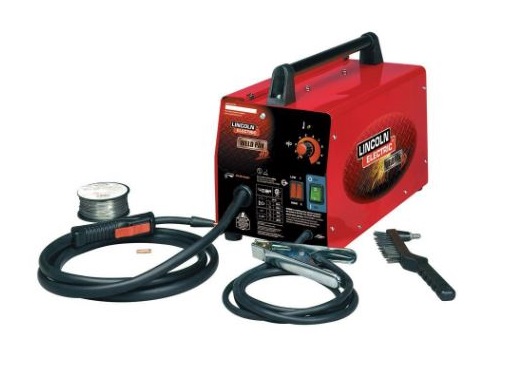MIG Welder

Safety Guidelines:
Check the area for flammable materials and ensure that they are stored in the appropriate area or are at least 35 feet away.
Be mindful of the fact that the fact that molten metal may spit several feet and ignite pieces of wood or paper. You may not always be aware that a fire has started when you wear a mask, so familiarize yourself with the locations of fire extinguishers.
Wear appropriate clothing: flame resistant shirts and pants made of a tightly woven material such as leather or wool as well as a welding apron.
Always wear sturdy leather gloves.
Do not roll up pants or sleeves and button pockets and collars completely in order to avoid accidentally catching sparks.
Wear sturdy boots or shoes that cover your entire foot with rubber soles to ground yourself.
Do not leave any skin exposed. Protect yourself from the UV radiation.
Wear the appropriate helmet to protect your eyes from the radiation and shield your face from sparks and slag.
MIG welding gives off ozone occasionally. Keep the area ventilated but do not use a fan to blow air across the work surface as that will disrupt shielding gas.
All welding produces vapors but read the MSDS for the material you are working with as it may produce poisonous vapors such as zinc coatings and aluminium alloys.
Alert anyone in the region that you intend to begin welding before you start in order to allow them to protect themselves.
Before starting to weld, take the plastic curtain out of the piano room to shield other people working in the shop from the radiation.
When welding, ensure that the tubing is completely straight and not bent or coiled such that it may prevent materials from passing through.
Do not work with pressurized containers.
One of the main dangers of welding is that it is often impossible to be able to tell whether or not pieces are hot, so use caution and never pick up pieces with your bare hands. Use welpers or gloves.
Always be aware of where the safety kit is located in the event of an incident.
Make sure that the area you are working in is clean and dry. Keep flammables away and do not work in areas that are wet as water will conduct electricity.